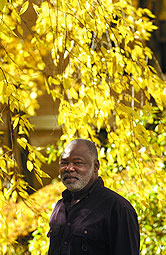

 |
||||
|
Around Tappan Square Thirty Years of African American Studies by Sue Angell '99
The department's 30th anniversary celebration peaks
in April with weekly events featuring students, professors, and
alumni within the fields of community development, education, and
the arts. The scheduled speakers--who include Omowale Satterwhite,
the program's first director, and Mohammed Chambas, a former professor
who is now executive secretary of the Economic Committee of West
African States, all contributed to the department in significant
ways. "There was a growing consciousness among the faculty and students that very little within Oberlin's curriculum had to do with African American history or life," says Albert McQueen '52, emeritus professor of sociology. "We began to push for these types of classes as a way to bring fresh life into Oberlin's egalitarian history." McQueen was recruited to teach at Oberlin in 1966 by his former mentor and sociology professor, George Simpson. They directed the Special Education Opportunities Program (SEOP), which helped prepare inner-city African American students for college life. It was a critical step in increasing the enrollment of minority students. "We knew that the vast majority of black students came from lower-income backgrounds and shaky academic preparation, which meant that not many of them would enter or succeed in college," McQueen says. "SEOP went into inner cities to recruit such students and bring them to Oberlin for summer sessions of intensive, pre-college preparation. If they got into Oberlin, we continued to help them during their tenure here." The program was successful, but there was a growing awareness on campus that more had to be done to level the playing field. A faculty committee was formed to facilitate the growth of coursework in African American studies, and by the fall of 1968, Oberlin had in place an official black studies curriculum with courses in anthropology, the dramatic arts, education, English, history, psychology, sociology, and social science. "We made a mammoth effort to recruit outstanding black faculty members--people like Calvin Hernton, Booker Peek '66, and Yakubu Saaka," says McQueen. "From very modest beginnings, we created a program with a rich set of offerings that evolved into a department in 1983." Saaka, fresh out of graduate school at the University of Ghana, was among the first hires of Oberlin's newly formed African American Community and Student Development Program in 1972. "At first, there wasn't much of an age difference between my students and myself," he says. "I lived in Afrikan Heritage House with them and worked very hard to make it an active community center. Sometimes I even taught classes in the lounge to get away from the idea of higher education as an ivory tower for the privileged few." Creating student leadership opportunities was also a concern of the faculty, as was developing a legitimate link to the larger African American community. Thus, part of the program's mission was to nurture a sense of activism in its students. The department supported a student-run initiative called Shule, which began as an after-school tutoring program for African American students and evolved into an independent institution for elementary students. Shule became part of a nationwide movement intended to provide an alternative school centering on black history, culture, and community, while still offering the basics in science, math, and reading. Today, the African American Studies Department boasts courses in African American, African, and Caribbean history; West African dance; and African diasporic literatures, politics, theater, music, art, and education. "Over the years, we moved our focus away from community service, because the College has embraced this idea in general," says Saaka. "We may focus on academics now, but we still believe in opening ourselves to and making connections with the local African American community."
|
|
|
|
 "From
the beginning, Oberlin took its commitment to this program very
seriously," says Yakubu Saaka, professor of African American
studies and chair of the department. What we have on campus
today is extraordinary for a school this size."
"From
the beginning, Oberlin took its commitment to this program very
seriously," says Yakubu Saaka, professor of African American
studies and chair of the department. What we have on campus
today is extraordinary for a school this size."